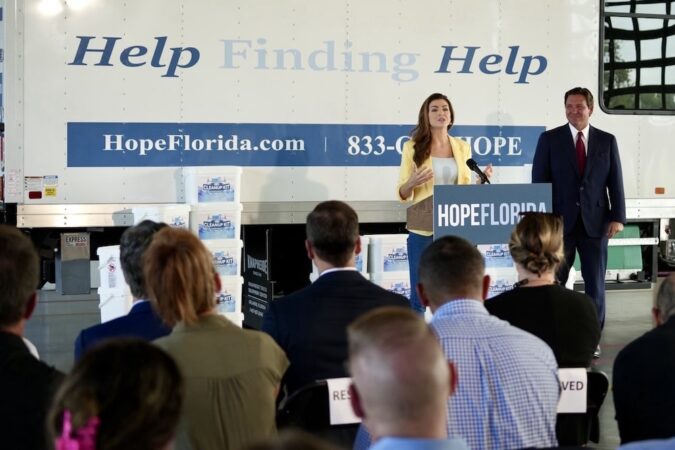
State Rep. Alex Andrade, chair of the Health Care Budget Subcommittee, has announced plans to investigate the Hope Florida initiative. This program, championed by First Lady Casey DeSantis, has recently faced scrutiny over potential compliance and transparency issues.
What is Hope Florida?
Established in 2021 and recently formalized as an office within the Executive Office of the Governor this January, Hope Florida was created as a “first-of-its-kind initiative” designed to connect Floridians in need with community resources outside government. The program employs “Hope Navigators,” who guide participants toward economic self-sufficiency through partnerships with non-profits, faith-based organizations, and private businesses.
Claimed Successes and Questionable Numbers
Gov. Ron DeSantis and First Lady Casey DeSantis have touted the program’s accomplishments. According to a Jan. 14 announcement from the Governor’s office, Hope Florida has already helped “more than 30,000 Floridians decreasing or eliminating reliance on public assistance” and could potentially “save taxpayers nearly $1 billion over the next 10 years.”
- However, Rep. Andrade has expressed concerns about these claims. In a phone interview with me yesterday, he questioned whether the reported reduction in welfare dependency can be attributed to Hope Florida or simply reflects normal Medicaid disenrollment patterns.
“They claim they’ve helped 30,000 people get off welfare, but those numbers track with the number of people who’ve rolled off of Medicaid anyway, so I’m not sure if those numbers match up,” Andrade stated.
Compliance and Transparency Issues
More troubling are allegations that the initiative’s charitable arm, The Hope Florida Foundation, may not be complying with state laws governing oversight, ethics, and fundraising. According to a Miami Herald report, a Republican-led House committee analysis found that the foundation operates as a “direct support organization” (DSO) under state law but appears to be ignoring the legal requirements of this designation.
- State law requires such organizations to publicly disclose their mission, three-year plan, code of ethics, tax returns, and other records on their website and in communications to House and Senate leadership. The foundation reportedly has not provided this information online or to the Legislature. When a House staffer requested these materials in February, they reportedly received only unsigned bylaws.
Alleged “Strong-Arm Tactics” Under Investigation
Additionally, Andrade expressed concern about potential ethics issues, including allegations that the Governor’s office has used “strong-arm tactics” to pressure state vendors to donate to Hope Florida.
- “There’s reports of them coercing state employees to work directly for this DSO instead of doing their regular legislatively authorized day jobs. And again, there’s reports about them pressuring state vendors prior to contract awards to donate to the program,” Andrade said.
Next Steps in the Investigation
Andrade emphasized that these significant questions must be addressed before the end of the legislative session, particularly as Gov. DeSantis seeks to formally codify Hope Florida into state statute and secure dedicated state funding for the program.
The investigation comes at a pivotal time for Hope Florida, which has expanded considerably since its inception. The program now claims to have referred over 100,000 Floridians for assistance, established 5,600 Hope Florida partners, and integrated more than 2,000 faith-based partners into its network. In January, Erik Dellenback was appointed as Executive Director of the new Hope Florida office within the Executive Office of the Governor.
As Rep. Andrade’s investigation progresses over the coming weeks, all eyes will be on what his committee uncovers about this high-profile initiative that has been characterized by Gov. DeSantis as “the alternative to government dependency” and by the First Lady as “revolutionizing the way state governments meet needs.”



